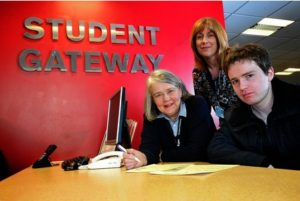
Why every university needs a Disability Society
Why every university needs a Disability Society
Of all the accomplishments that I have to write about on my CV, dear readers, there isn’t a single one I am prouder to talk about than being the founder and first chairman of the Disabled Student’s Society of De Montfort University, a community of friendship and support where all disabled students could feel welcome and meet others like themselves. I kid you not, this even includes my degree itself – although I feel extremely fortunate to have studied at such a supportive environment as DMU, I felt as though I had contributed something that was potentially very valuable to disabled student welfare, a cause that I came to feel deeply passionate about as a result of my time at DMU.

Saints and Scroungers aired on BBC 1
The idea came to me in 2013 during my second year, a year so wonderful for me that I would do just about anything to relive it. That year, after I was interviewed by the BBC and my story of success at university appeared on Saints and Scroungers, and soon after that when I received the honour of being the winner of the Student Choice Award for ‘outstanding achievements’, I was encouraged to run for the position of Disabled Students’ Representative. Despite being honoured by the encouragement, I began to ask myself “what could I bring to the table if I were elected?”. I asked myself this question as a disabled student myself – what were my biggest needs? What general issues needed to be addressed? Most importantly, given the other two, what solutions could I bring to the table?
Well, the answer to my first question – and possibly the second, if you can interpret it that way – was the fact that despite the support already in place at my university, the fantastic disability support team and of course my mentors arranged through DSA – despite all that, I still felt somewhat alone … and lonely. See, I was looking at the aforementioned questions solely as a student with autism, and I know very well that I can hardly speak for all kinds of disabilities, but I did think it was a fairly safe bet that most if not all students with a condition similar to my own always felt frustrated when they couldn’t make others see why they have certain difficulties and felt that almost nobody understood them, which in turn left them feeling lonely. Maybe I was completely wrong about this, but no matter what condition/disability you have; autism, dyslexia, anxiety, depression; all of the above, at least in my experience, have certain difficulties and pains unique to them, but a common theme is the frustration and loneliness of not being understood. Either way, whether I was right or not, I had my answer to question one at least, and as said earlier, possibly for question two as well, by way of touching upon a general issue common to all disabilities/conditions.
Thus, in my manifesto I pledged to create a Disabled Students’ Society, and this turned out to be the thing that won me the election (spoilers: I won the election and became the Disabled Student’s Rep!). That doesn’t really do it justice I know – as I said it was one of the most important accomplishments in my life, but this blog is specifically about the Society and its purpose. I promised students a community where they could meet people in the same boat, so to speak: a group where everyone understood that everyone had their own problems and could seek help and friendship among other students with similar problems. It also served two other purposes; 1) in this way, I could get to meet and be accountable by the students I was to represent, and 2) we could campaign together to increase awareness and raise money for each disability and associated charities. Sadly, because I was now into my 3rd and final year, I wasn’t able to dedicate the amount of time that I wished to the Society, but it did accomplish the thing that I’d most wanted it to; providing disabled students with a place to find friendship and support, which was by far the major thing, and I’m pleased to say that the Disablity Society outlived my time at the university.
So, at last, we arrive to the subject under which this blog is titled; why every university ought to consider having a student’s society like the Disability Society, and why I believe it would be a valuable extension to the support available to students with special needs. Of course, not all ‘disabled’ students feel comfortable with the term ‘disabled’, plus I certainly wouldn’t want

Tom and the DMU Disability Team
to make students with mental health conditions feel unwelcome over a technicality, so it doesn’t need to share a name. However, if all universities had a society similar to mine, it would give students with special needs the opportunity to meet others in the same boat and find friendship and mutual support amongst each other. A society like this would also be good for representation of disabilities and mental health conditions; an important issue indeed as both remain under-represented and somewhat isolated. However, a society made up of these students, represented by a committee and their Student Union’s Representative will be able to voice their needs as a collective to the university, and by holding public events, the community as well. By bringing the creativity of several students with special needs together, and they can produce all kinds of ways to increase the profile of special needs, both in and out of education.
Although I was too into my final year to really give the society the attention it deserved, if the society’s committee can dedicate the time needed and if the university itself encourages the growth of the society, I believe there is a vast amount of potential to do good that can be realised. In the way that a tree will grow and bear fruit if it is watered (I know that’s leaving out a good few details, but unfortunately I know nothing about botany L), encouraging the growth of a society built around the idea of providing support and friendship for students with special needs, I submit to you that such students will feel more comfortable and less alone within the university setting, which naturally will lead to greater success and fewer falling by the wayside. Although disabled students have made their mark in recent decades, in my humble opinion stemming from my own experience there is great potential left untapped. Although the idea for a Disability Society was not exactly revolutionary, I firmly believe that it would enable us to take a big step forward in disabled student welfare.
I hope I have at least shown you, dear reader, why I consider this my most important contribution to my old university, and hope to see similar societies emerging in the future.
